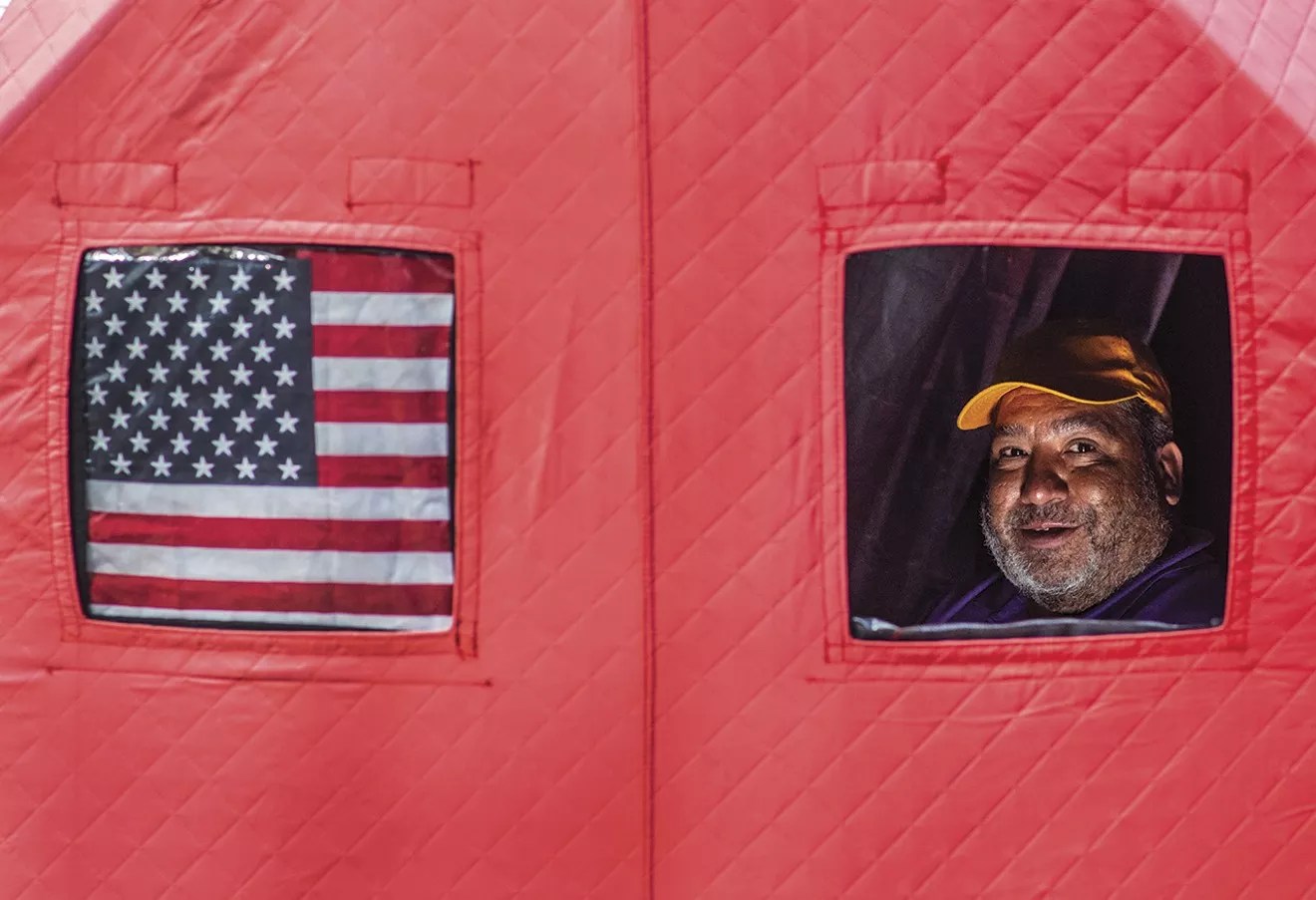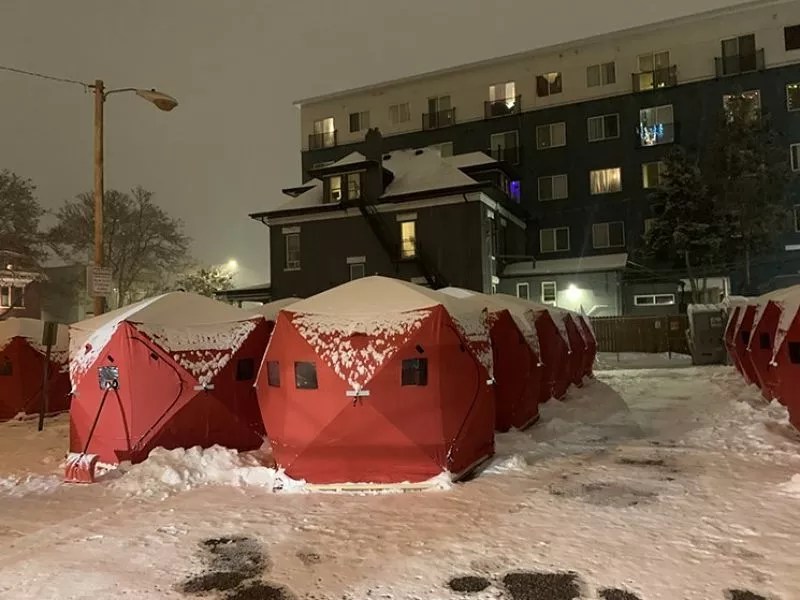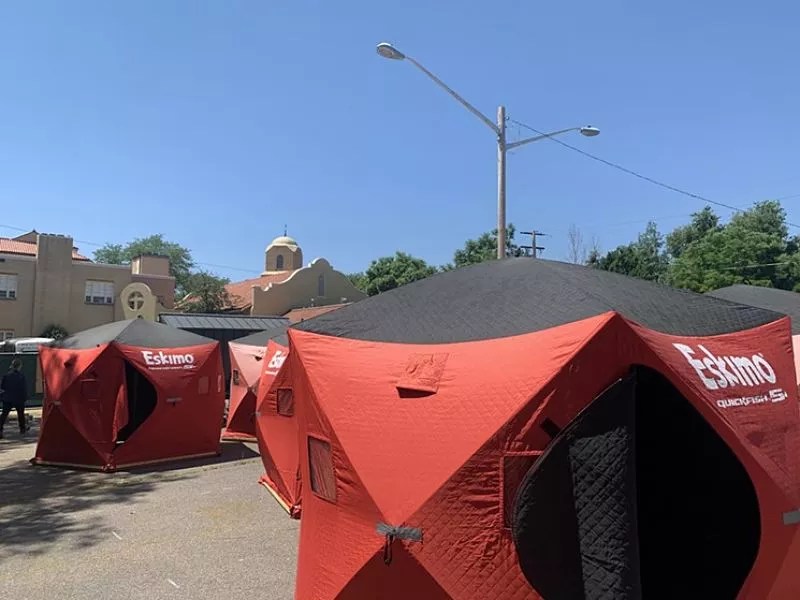
Evan Semón

Audio By Carbonatix
When Denver was in the first month of the pandemic, local service providers pitched an idea to Mayor Michael Hancock’s administration: The City of Denver should allow organizations to set up safe-camping sites for people experiencing homelessness, where they would be safer from COVID and also have centralized access to sanitation and services.
While thousands of individuals use Denver’s shelters every year, many others do not feel comfortable staying in them – sometimes for mental health reasons, sometimes because they don’t want to be separated from partners or pets. The COVID pandemic added another layer of concern given the highly transmissible nature of the virus, especially in indoor settings.
Still, Hancock was skeptical of the concept. “At this time, we don’t see a reason for us to create outdoor sanctioned campsites…in the city of Denver,” Hancock said at an April 2020 press conference. “We’re not going to move in that direction, but we are going to continue to work hard to create opportunities indoors for our residents.”
But by the summer of 2020, Denver was grappling with large homeless encampments that had sprung up in front of the Colorado Capitol and at nearby Morey Middle School, among other spots in the core city. By then, the city had restarted the sweeps that had been largely paused in the early months of the pandemic, and the city was coming in for heavy criticism.

An encampment popped up outside Morey Middle School in the summer of 2020.
Evan Semón
In early July, less than three months after he’d voiced his opposition, Hancock reluctantly announced his support for the safe-camping sites, saying that “extraordinary times” call for “extraordinary measures.”
“I think he was clear in 2020 that the reason we were moving forward with this experiment was the realities of COVID and the difficulty of getting people in congregate settings and safely keeping them socially distanced,” recalls Alan Salazar, Hancock’s chief of staff. “The mayor’s reluctance was always based on the difficulty of containing this kind of temporary housing system before it would get out of hand and become unsafe and unwieldy and it would no longer be temporary.”
It’s been over a year since Hancock announced his support, and the City of Denver has now fully bought into the idea of using safe-camping sites as a harm reduction and stabilization tool for people experiencing homelessness who, for one reason or another, are not inclined to use the existing shelter system. The Hancock administration has even proposed allocating $4 million in American Rescue Plan Act funds to build out the city’s existing safe-camping site program while looking at expansions.
“To think of that progress in not even eighteen months’ time, to step back and look at that, it’s just like, wow,” says Cole Chandler, director of the nonprofit Colorado Village Collaborative, which runs the two current sites. But getting to this point was challenging.
“When the mayor announced his support back then, it wasn’t like he was throwing everything behind it,” Chandler notes. “It was like, ‘Okay, we’ll let this happen.'”
And it didn’t happen fast. Just a few weeks after Hancock announced his support for safe-camping sites, word of the first possible location leaked out: the parking lot outside the Denver Coliseum, which was already housing a temporary 24/7 shelter during the pandemic.
Residents of the Globeville and Elyria-Swansea neighborhoods quickly voiced opposition to the proposed site, arguing that the city had consistently dumped projects and services in their part of town that weren’t wanted elsewhere in the city. Since the Coliseum parking lot is city-owned land, Denver City Council would need to approve a lease agreement before anything could happen there, and both at-large councilmember Debbie Ortega and Candi CdeBaca, who represents the GES area, said they’d oppose any agreement regarding a safe-camping site.
Service providers like Chandler, who’d already worked to set up tiny home village facilities in the city, began looking for alternatives.
In August 2020, representatives of the Curtis Park Neighbors organization pitched the idea of setting up a safe-camping site in the parking lot between the Blair-Caldwell African American Research Library and a church on Welton Street. Chandler took their proposal to city officials.
The library wanted to keep its access to the parking lot, which wasn’t really large enough for a safe-camping site, so Chandler suggested a larger spot on the other side of the library. The next month, Hancock posted on Facebook that his administration had selected Cousins Plaza, located between the library and the playground section of Sonny Lawson Park, as a possible location for a safe-camping site.
The announcement came as a relief to Chandler, since the CVC had already inspected over 100 potential sites. But it turned out that other neighbors weren’t about to welcome a safe-camping site, and the Five Points Business Improvement District lobbied heavily against the proposal. Just days after officially endorsing the site, Hancock again took to Facebook to announce that he had decided to stop moving ahead with the plan.
It became clear that putting safe-camping sites on public property would not be easy. Leases for sites on private property, such as church parking lots, didn’t require the sign-off of elected officials, however.
On the first weekend in October 2020, Chandler and other safe-camping site proponents hosted an open house at a model site in the parking lot of the Belong Church, at East 16th Avenue and Ogden Street.
“I think people don’t understand what we’re proposing. A lot of people think that we would sanction camping as it currently exists. What we’re trying to do is show how this is different,” Chandler explained. The model certainly looked different from what Denver residents were seeing at unsanctioned encampments. Tents were uniform and sturdy, and there was no trash strewn about. There was even an on-site porta-potty.

Denver’s first safe-camping site opened last December.
Conor McCormick-Cavanagh
In November 2020, the CVC and another nonprofit, Earthlinks, announced that they would be setting up safe-camping sites in the parking lots of the First Baptist Church, on the 1300 block of Grant Street, and the Denver Community Church Uptown, on the 1500 block of Pearl Street; the goal was to open the sites in December.
Councilman Chris Hinds, who represents both Capitol Hill and Uptown, said that of the 100 emails his office had received from constituents about the proposed sites, close to 85 percent expressed opposition.
“They go into explaining why they oppose, and the information they provide explaining why they oppose does not reconcile with the information that I have heard from the proponents,” Hinds said at the time. “Basically, people are reacting out of fear, as in: They have seen unsanctioned camps all over in the areas where these two proposed sanctioned camps will be, and they think we’re going to have more of the same. And frankly, they’re not the same.”
With permits issued by the Denver zoning administrator and six-month leases from the churches, the two sites opened the next month with a few dozen residents each.
People who had been living on the streets for years were finally able to stay in a stable location without fear of being swept. Some got jobs, applied for permanent supportive housing and saw a doctor for the first time in years. There were some low moments, though: A 34-year-old woman staying at the site outside the First Baptist Church died of a drug overdose in late December 2020. And not all residents were able to adapt to the structure and rules; some ended up leaving early.
Still, despite early concerns from neighbors, the sites – clean and staffed 24/7 – were considered a major success overall.
By April 2021, as the expiration of the leases approached, Hinds said that the safe-camping site concept “should absolutely be kept after the pandemic.”
The city has “an obligation” to continue deploying safe-camping sites, added at-large councilmember Robin Kniech. “Unfortunately, the crisis of homelessness is unlikely to subside with the vaccine. It would be silly to turn our backs on what we’ve learned works at the end of this pandemic. If we’re serious about building back better, then safe outdoor spaces will continue to be far better than unregulated camping for both unsheltered individuals and communities.”
For the next round of six-month leases, the CVC planned to relocate residents to a parking lot on Montview Boulevard between Glencoe and Forest streets; Park Hill United Methodist Church had already agreed to host a safe-camping site. But a handful of neighbors filed a lawsuit to block its establishment, expressing concerns about safety and possible effects on the area. In mid-May, a Denver District Court judge dismissed the lawsuit, saying that the plaintiffs had not exhausted all of their potential administrative remedies, including appealing to the Denver Board of Adjustment for Zoning.

Some Park Hill neighbors fought a safe-camping site.
Conor McCormick-Cavanagh
Even as the neighbors filed that appeal, the Park Hill safe-camping site welcomed its first residents. On July 20, the board voted 3-2 to reject an appeal of the zoning administrator’s decision to allow for safe-camping sites across Denver. Then on August 3, at a second hearing, the board voted 3-2 in favor of an appeal of the decision to issue a permit for the Park Hill safe-camping site. However, a supermajority was required to overturn the zoning administrator’s decision, so the permit stayed in place.
Two weeks later, Park Hill residents filed another lawsuit, again challenging both the Park Hill safe-camping site permit and the city’s decision to allow safe-camping sites across the city; a judge has not yet ruled on that case. Meanwhile, both the church and the neighborhood report that life has been quiet by the parking lot.
At the same time that the Park Hill site was being set up, Regis University welcomed a safe-camping site on a parking lot on the school’s campus. This site is run by the CVC and the St. Francis Center.
“I have not heard one complaint from my constituents at Regis,” Councilwoman Amanda Sandoval, whose district includes the campus, said at a September 22 budget hearing for the Department of Housing Stability. “As long as Regis is continuing to partner, I think northwest Denver is willing to partner as well.”
“I would agree with Councilwoman Sandoval. I think, overall, the experience has been very, very positive, both for the university and the community,” says Jenna Farley, a Regis University spokesperson. The school’s music department is planning to provide meals at the safe-camping site on October 22, and also present a free concert for residents in the parking lot.
Although Chandler plans to move residents of the Park Hill safe-camping site to another location when that lease runs out, he and his team hope to renew the lease at Regis University.
“We’ve requested an extension, and we’re feeling optimistic about it,” says Chandler. Regis officials will make a decision soon, according to Farley.
By the end of January, the CVC plans to have four operational safe-camping sites that would collectively serve 300 people. Assuming that Regis remains a site, the three others would be a replacement for the Park Hill location, a Native American-inclusive site and a fourth spot somewhere else in the city.
And given that the political will appears to be significantly shifting in favor of safe-camping sites, Chandler believes that putting a site on public property could now be feasible, even with the requirement that Denver City Council approve the lease.
Given the rough start for what some city officials had considered a “fringe idea,” the success of the sites has been “amazing,” Chandler says. “I felt political will was holding that option back in the past. But new policy priorities and funding increases suggest that the political winds have changed.”
“I do think Cole is probably right,” notes Salazar. “I do think we’ve got some success under the belt.”
And that success could be enough to carry the sites past the pandemic. “I remain greatly impressed by the management of the safe outdoor spaces and the care provided to the residents utilizing them,” says Hancock. “We will continue to evaluate their effectiveness, and as long as they provide a necessary service to connect unhoused residents to more permanent and supportive housing, it’s a homelessness-resolution tool we will maintain.”
The City of Denver has a lot of tools in its homelessness-resolution toolbox – and has been spending significant money on them in recent years. In the 2021 budget, the city earmarked around $91 million for housing and homelessness; the city has also devoted large amounts of federal emergency COVID relief funds to the issue. In its 2022 budget proposal, the Hancock administration suggested spending $190 million on affordable housing, housing stability and support for people experiencing homelessness, with the help of general fund money, special revenue funds and federal relief money.

An encampment by Four Winds was swept in late August.
Conor McCormick-Cavanagh
Denver City Council will vote later this month on the allocation of approximately $100 million in American Rescue Plan Act funds. The city has received $154 million in ARPA funds so far; $46.2 million has already been allocated. Next year, Denver will receive an additional $154 million. Among the allocations the council is now considering is $4 million for the expansion of the safe-camping site model, which will help the CVC fund the four sites going forward.
That $4 million figure represents a huge bump from past funding; last February, the council approved just a $900,000 allocation for safe-camping sites.
As a result of the city’s support, the CVC has started growing significantly as an organization. In 2019, the nonprofit received $120,000 in city funding. For 2022, the group is projecting that it will receive $3.8 million from Denver coffers.
“We’re planning to grow from eighteen full-time employees to basically 35 in the next three to four months,” Chandler says. Those employees will include a chief operating officer; the CVC also recently snagged a communications staffer from Regis University, who will soon become the organization’s head of communications and development.
But the safe-camping site concept is not home free in Denver. Initiative 303, a measure on the November ballot sponsored by Garrett Flicker, chair of the Denver Republican Party, would give citizens the right to sue the City of Denver if it doesn’t enforce the camping ban within 72 hours of receiving a citizen complaint. Denver has already sued the proponents, arguing that the 72-hour deadline conflicts with a federal judge’s order that requires the city to give residents of an encampment a seven-day notice before a sweep.
Initiative 303 would also cap the number of safe-camping sites on public property at four. Although there are currently no safe-camping sites on public property, Chandler says that this provision would harm “our vision to expand.” A decision on the city’s suit is pending.
While Denver City Council could tinker with Hancock’s proposal for the ARPA money allocation, the $4 million earmarked for safe-camping sites will almost definitely stay. That’s how safe the concept has become over the past eighteen months, as none of the fears about such spots have been realized.
“It has not been easy,” admits Salazar. “You still have issues, NIMBY issues. But I have to say – and I think the mayor has confirmed this – that this experiment has worked. Councilman Hinds, I think, was also reluctant early on, and he said recently in a budget hearing that this was good.”
In fact, at an October 12 council committee meeting to discuss the ARPA budget allocations, Hinds said: “As the host of the first two safe outdoor space sites, I think they were phenomenal, and I think they were transformative and they addressed things that our sheltered system in the Rocky Mountain region had not addressed before. … I see that it addresses a lot of concerns that our unhoused have for going into our shelter system, so I think that it’s great.”